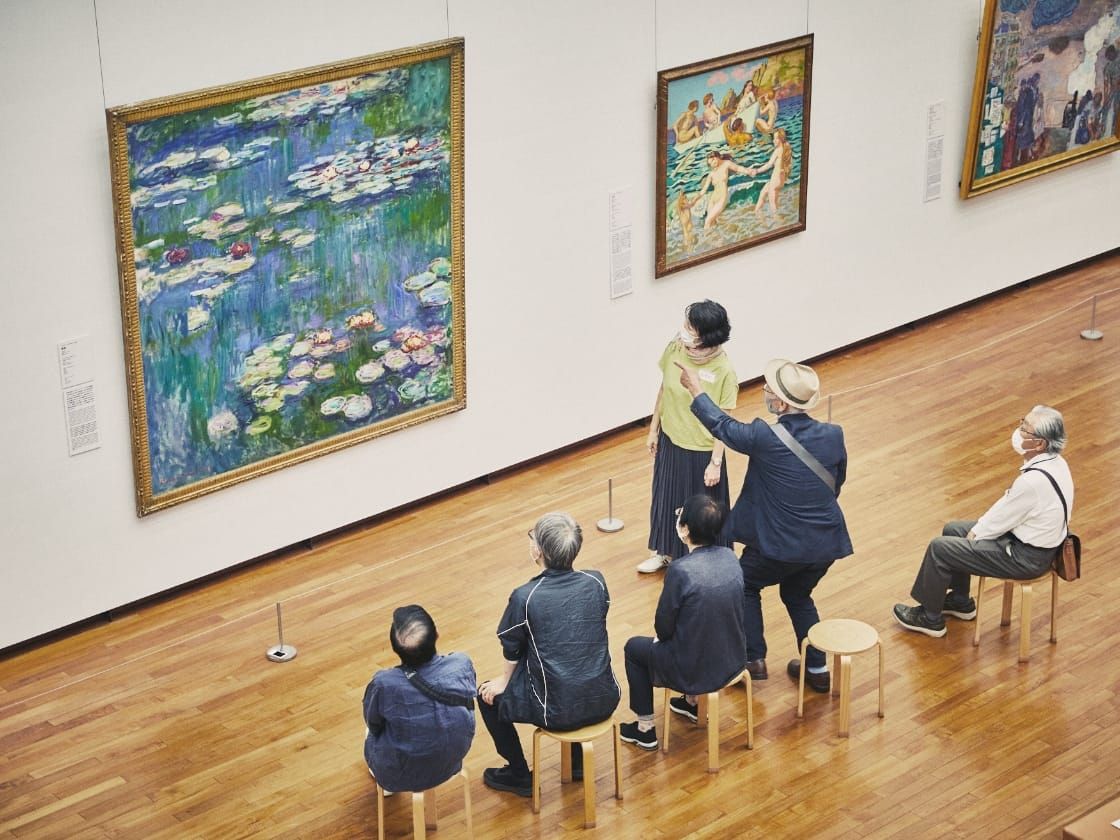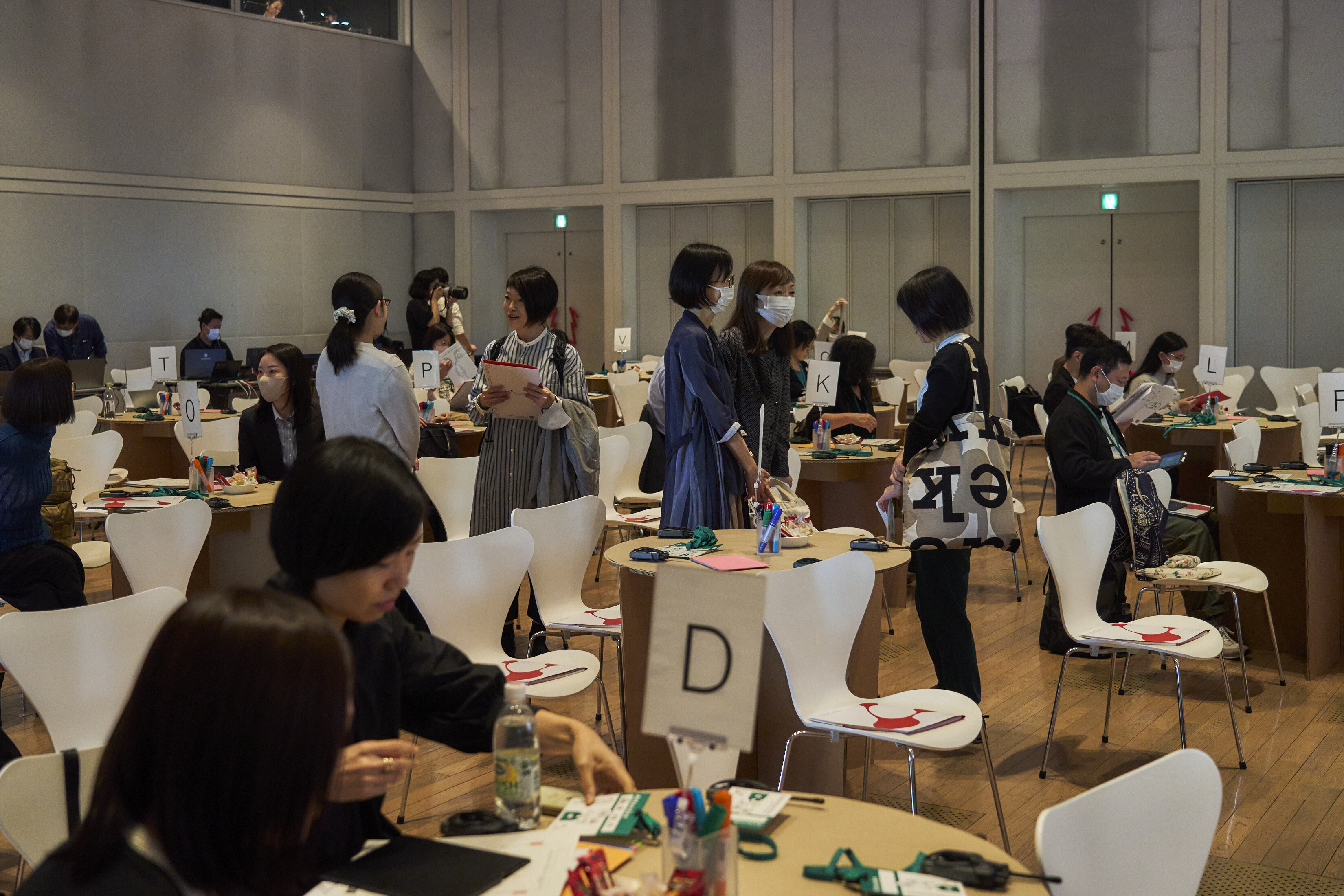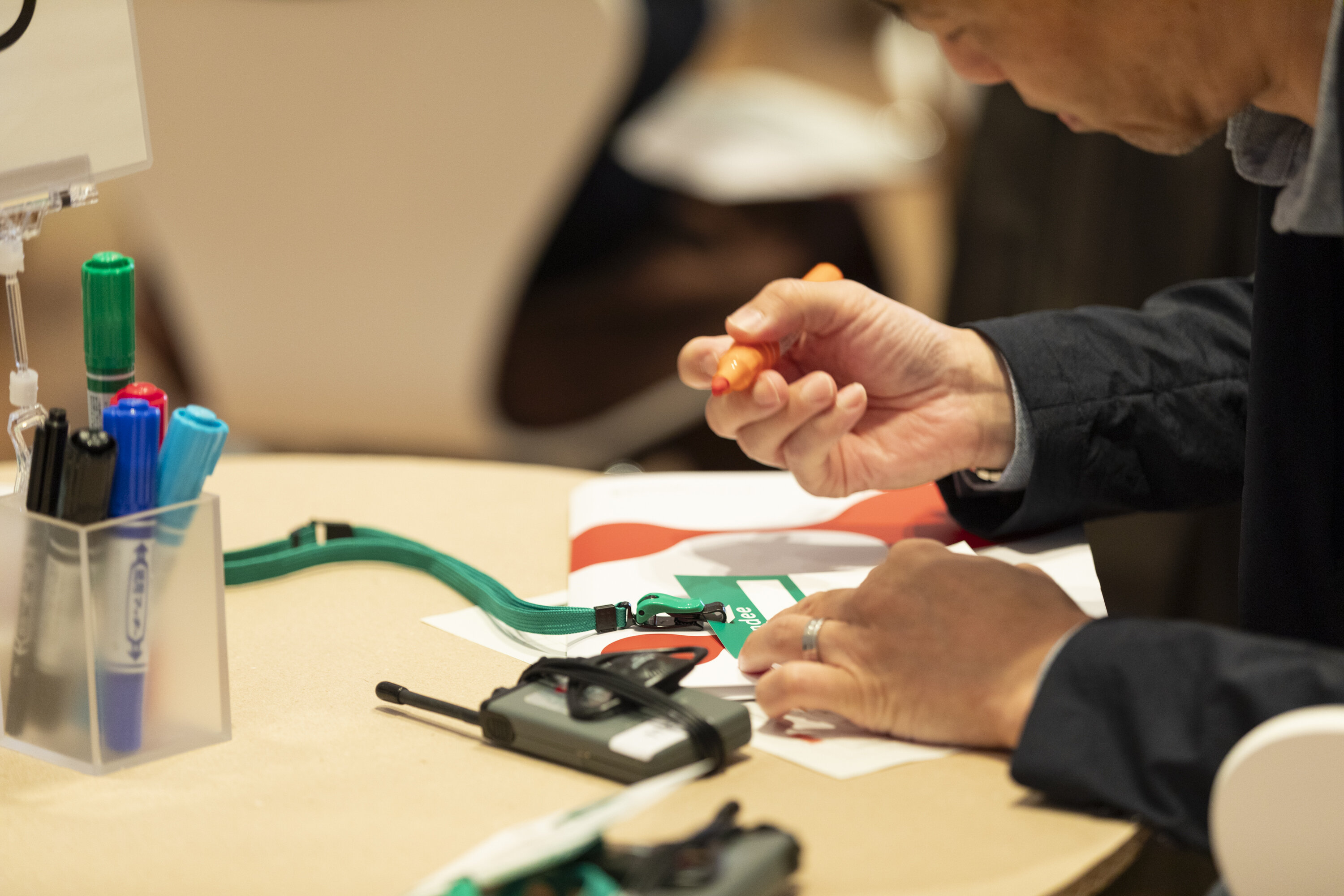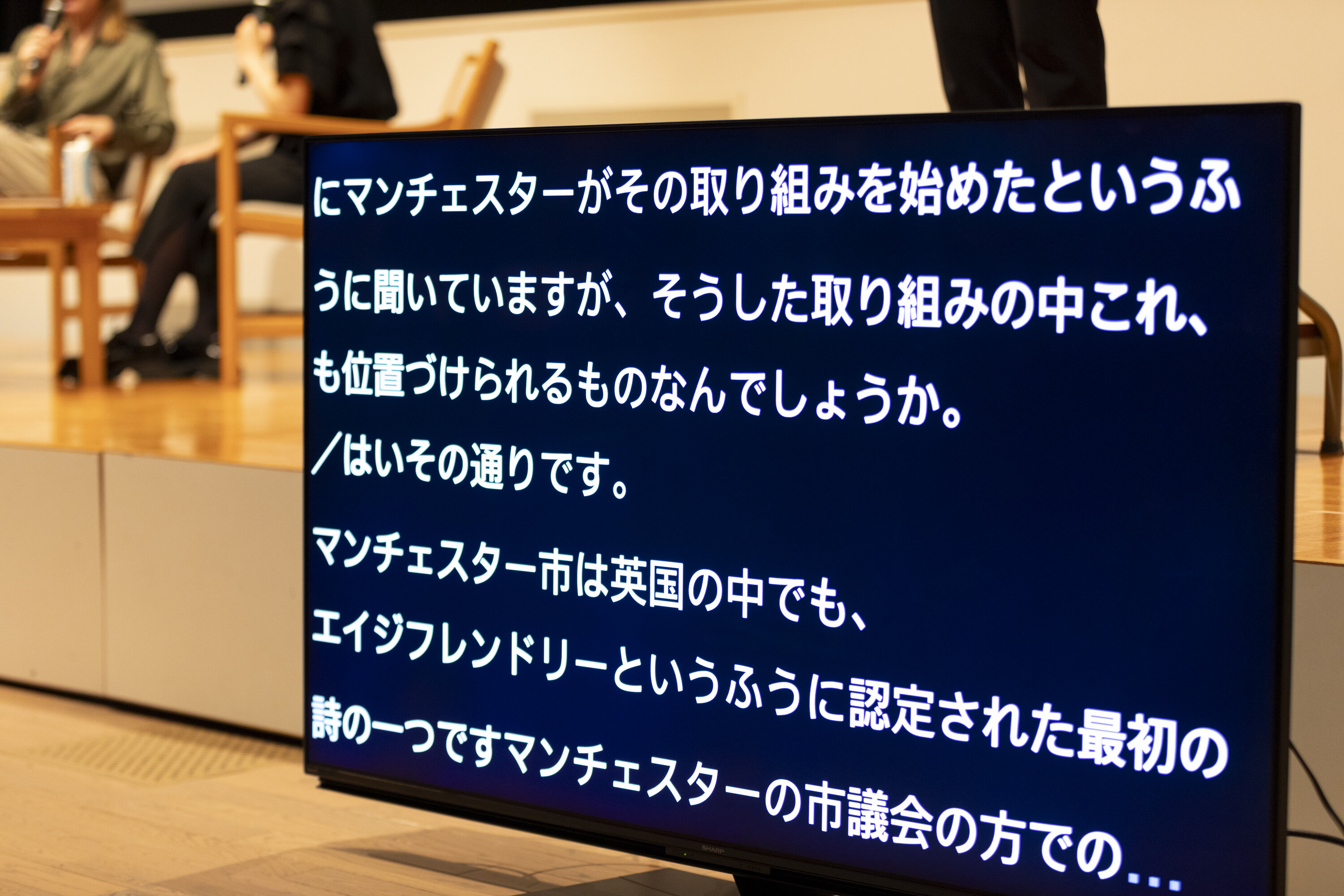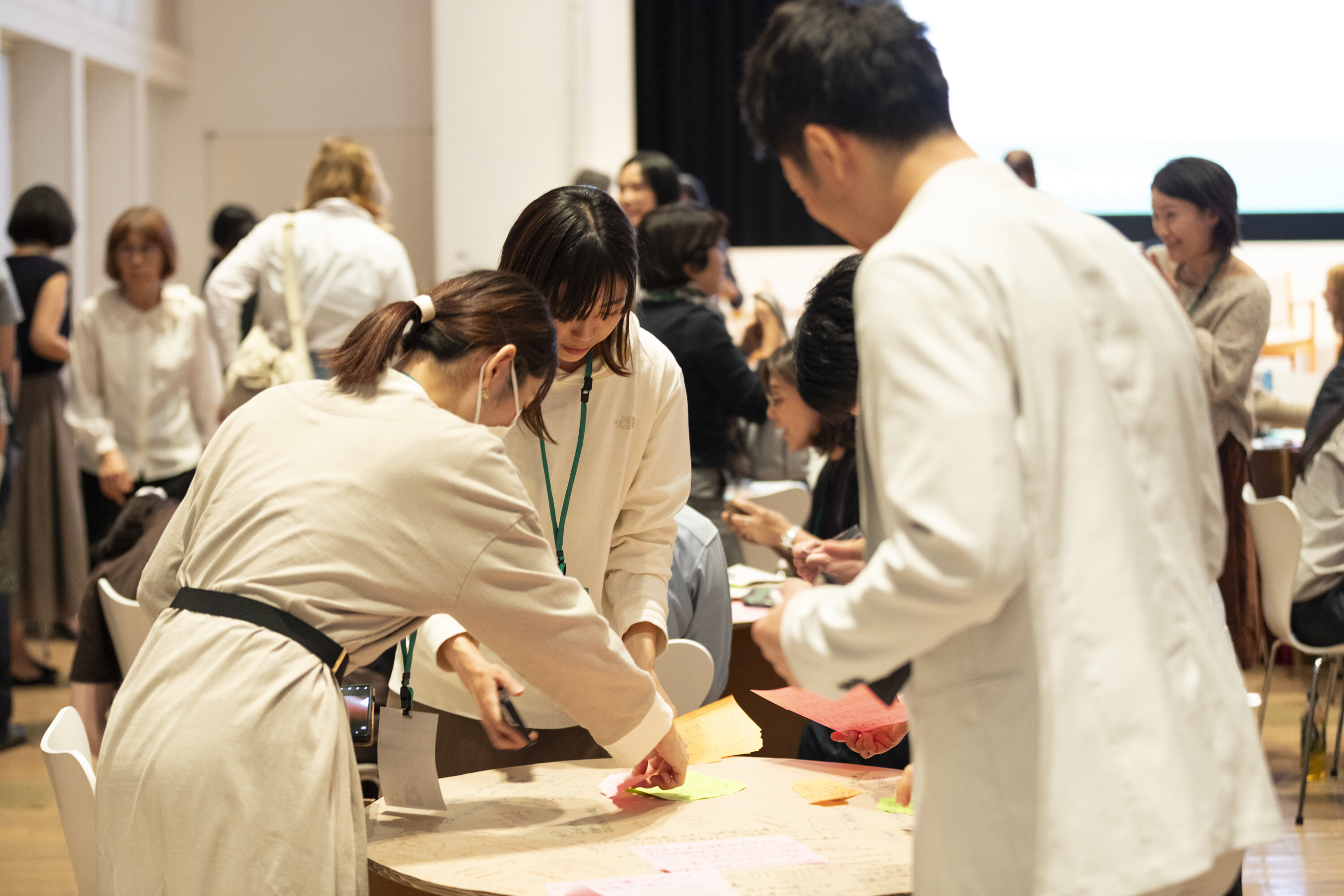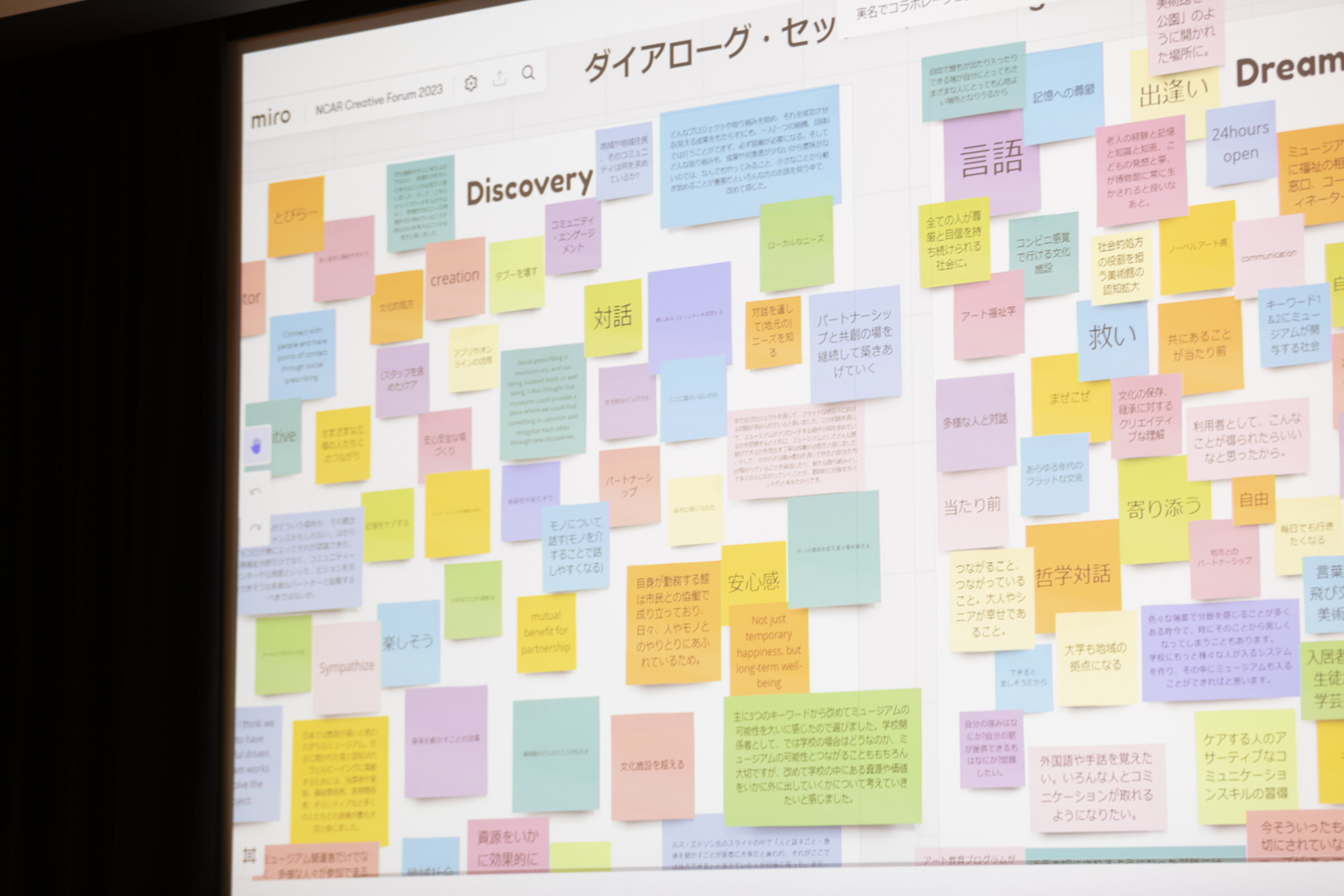[NCAR Creative Forum Event Report 2] Health and Wellbeing Initiatives Undertaken by Museums in the UK
Mao Takata, Social Cooperation Group, NCAR
![[NCAR Creative Forum Event Report 2] Health and Wellbeing Initiatives Undertaken by Museums in the UK](/en/upload/kyosei_0767_en.jpg)
Photo: Ryo Fujishima
On Sunday October 8, 2023, NCAR Creative Forum Art, Health and Wellbeing – Enhancing Wellbeing With Museums: Case Studies From the UK was held. This report will cover the atmosphere of the forum on the day, and from the perspective of forum participants, it will report on thoughts and feelings inspired by guest speakers' talks and interactive workshops.
Event Overview
This forum highlighted advanced initiatives in the UK that integrate art with health and wellbeing. It also featured a practitioner from Japan. The event was conducted in a hybrid format, offering both in-person attendance and live streaming options. Approximately 100 participants attended the venue in person, while the livestream drew over 700 participants.
Reference: [NCAR Creative Forum Event Report 1]
Venue Atmosphere
The auditorium of the National Art Center, where the event took place, was arranged with approximately 20 custom-made cardboard tables in an island-style layout. Each table had about five participants seated around it. This setup encouraged attendees to socialize and engage in conversations while waiting for the event to begin. Each seat was equipped with materials and a guide receiver, allowing participants to easily follow the forum with simultaneous Japanese-English interpretation. This commitment to accessibility, including providing simultaneous interpretation, was a unique feature of the forum, catering to a diverse audience. On stage, Japanese sign language interpretation was also provided, and real-time Japanese text interpretation was displayed on a screen below the stage.
Introduction
As an introduction to the forum, Sawako Inaniwa from the National Center for Art Research gave a presentation discussing international trends related to the key themes of "Health and Wellbeing." She provided an overview of how these issues are being addressed in the social and cultural contexts of Japan and the UK.
The introduction examined the factors influencing the evolving concept of "health" in Japan from a macro perspective. This included the impact of a super-ageing society, the influence of the Sustainable Development Goals (SDGs), and the global effects of COVID-19. The presentation also acknowledged the rise of global social movements such as MeToo and Black Lives Matter during the same period, which helped set the stage for understanding the background of the initiatives discussed in the subsequent inspiration talks.
Inspiration talks
The details of the 20 minute inspiration talks given by each of the five guest speakers can be viewed in the recorded video. In this report, the author will provide a summary of the outlines of these talks and offer reflections on the key themes, memorable remarks, and main points of discussion.
Project to Enhance Commitment Between Museums and Local Communities in Manchester (Case Study)
Speaker: Ruth Edson, Learning Manager: Communities, Manchester Art Gallery
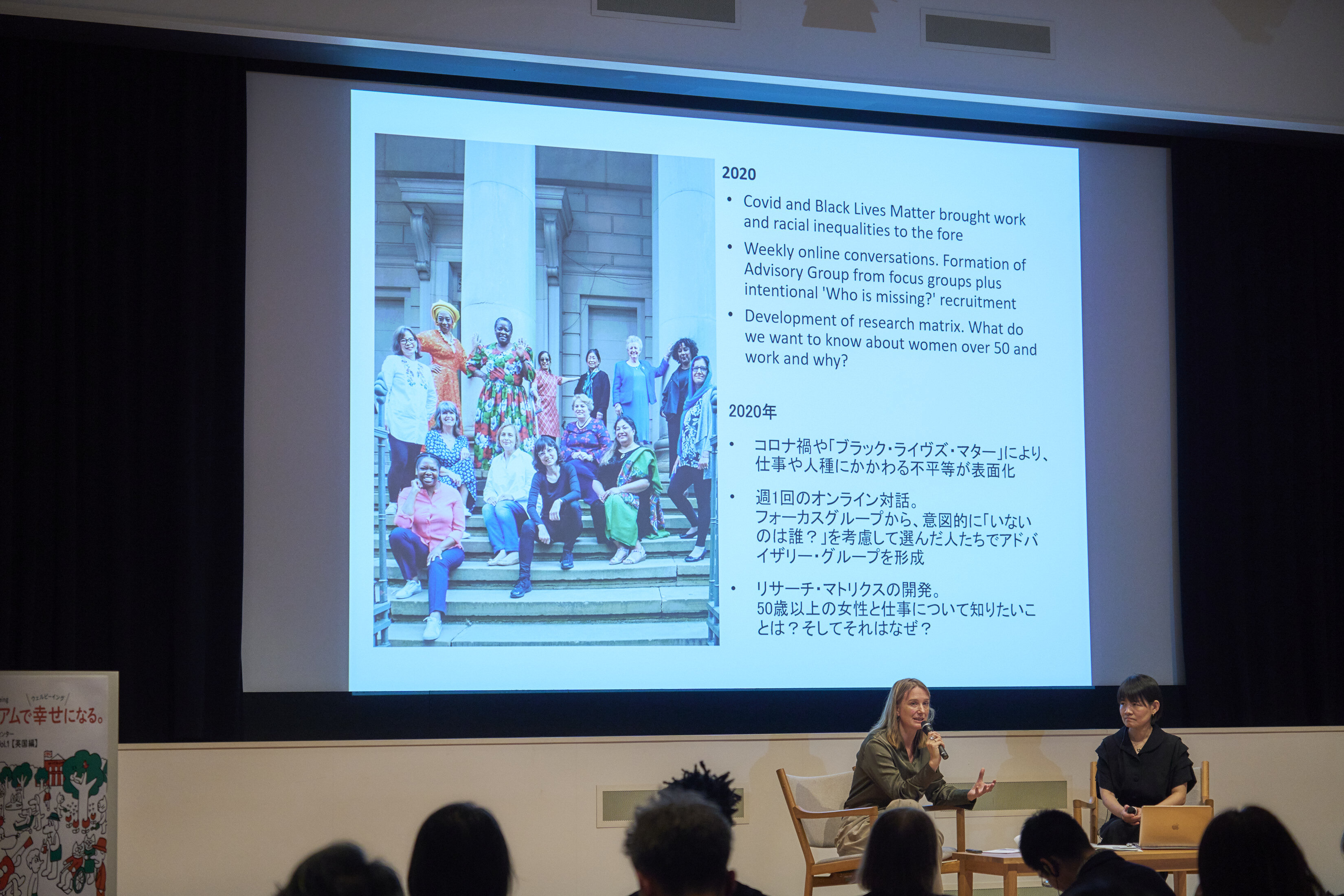
Presentation by Ruth Edison(Photo: Ryo Fujishima)
Two case studies are presented in this talk, each focusing on a different museum's attempt to address the challenges faced by local communities. The first case from Manchester Art Gallery centers on the project Uncertain Futures, a collaborative art and research project, which addresses inequalities in "work" and "pensions" among women over 50 in Manchester. The second case utilizes the closed museum Platt Hall for the Platt Hall InBetween project, which experiments with the concept of social prescribing within the community. Both projects present unique and formidable challenges, but Platt Hall InBetween in particular, may be considered pioneering globally for its practical integration of social prescribing mechanisms into the community
House of Memories, a Dementia Awareness Program at the National Museums Liverpool (Case Study)
Speaker: Carol Rogers, Director of House of Memories, National Museums Liverpool
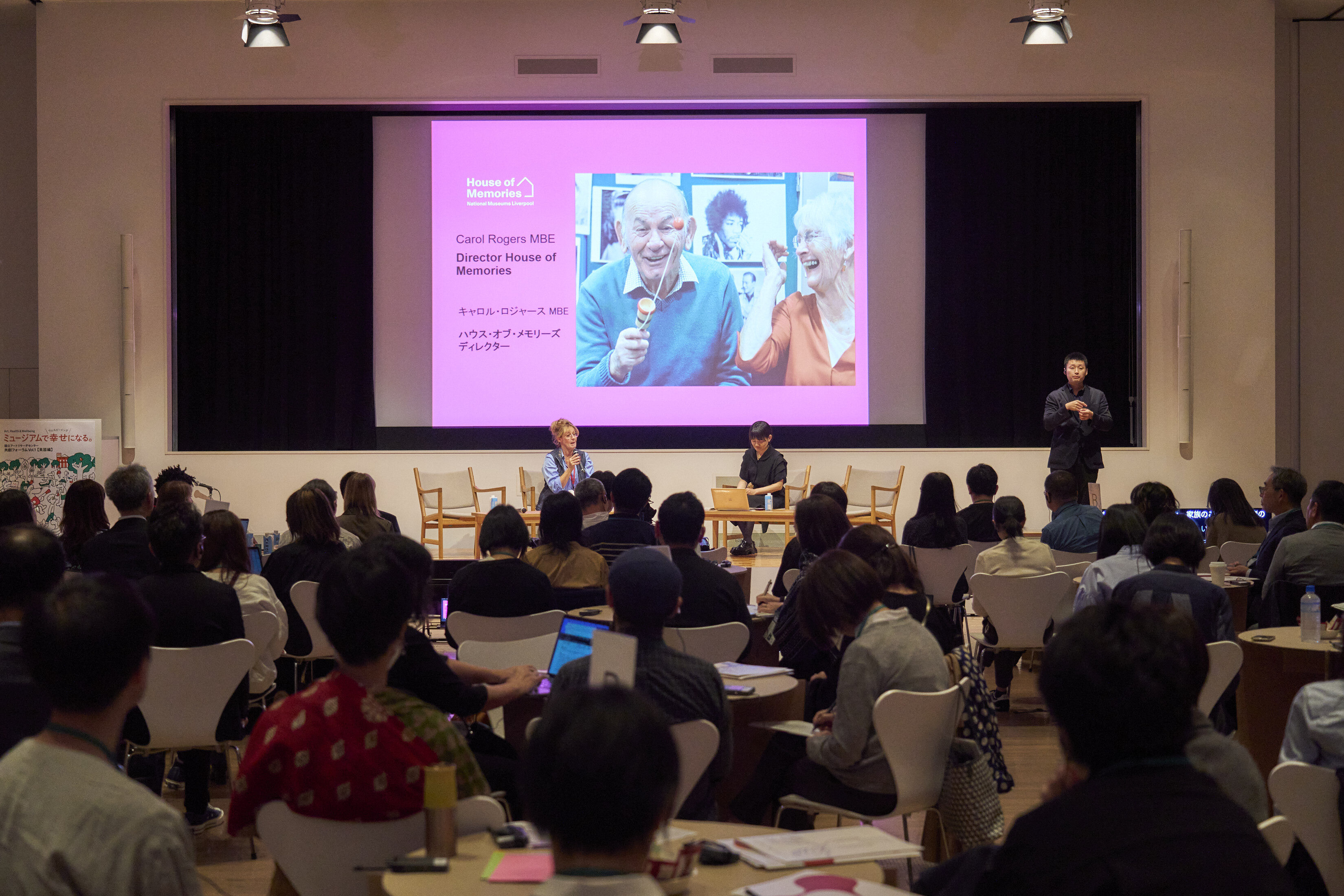
Presentation by Carol Rogers(Photo: Ryo Fujishima)
This talk introduced House of Memories, an international dementia awareness program developed and implemented by the National Museums Liverpool. Starting with a simple paper featuring a Memory Tree (NOTE), the program has expanded over a decade to include various innovative elements. These include a portable toolkit, a tablet application specifically designed for dementia care called My House of Memories, and House of Memories On the Road, which involves a van equipped with collections that allow the program to be conducted outside the museum. She described the program as an ‘innovation from a world-leading museum that supports the dementia community’, which showed her pride in the museum's achievements over the past decade and highlighted their sense of responsibility to society. Her talk was truly impressive, demonstrating her entrepreneurial spirit.
Vision and Partnership Strategy for the Learning Program at Tate Museum
Speaker: Mark Miller, Tate Director of Learning
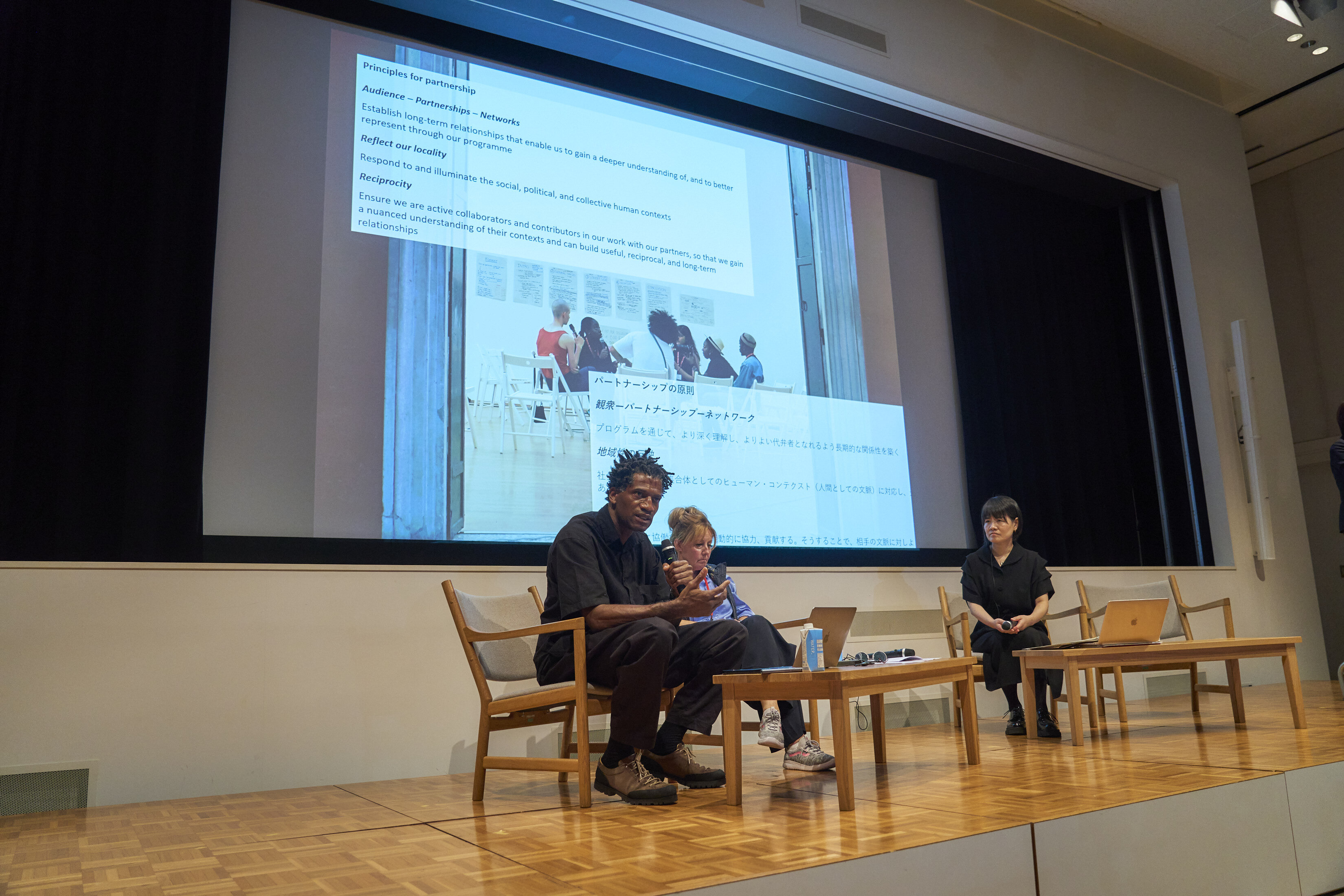
Presentation by Mark Miller(Photo: Ryo Fujishima)
Mark Miller's focused on the inherent "questions" that museums face or should consider when engaging with society. He addressed the role that Tate Museum should play in society, the needs of the local community, what is currently being achieved and what is not, and how to prioritize addressing these needs. He also emphasized the importance of continually questioning key issues, such as the meaning of "care," whether cultural institutions can utilize care as a skill, and whether the museum's training and programs genuinely contribute to care. These thought-provoking questions resonated deeply with many forum participants, leading to introspection and ongoing contemplation. Many participants were observed nodding and taking notes.
Community-based collaboration between Dulwich Picture Gallery and the healthcare center
Speaker: Jane Findlay, Head of Programme and Engagement, Dulwich Picture Gallery
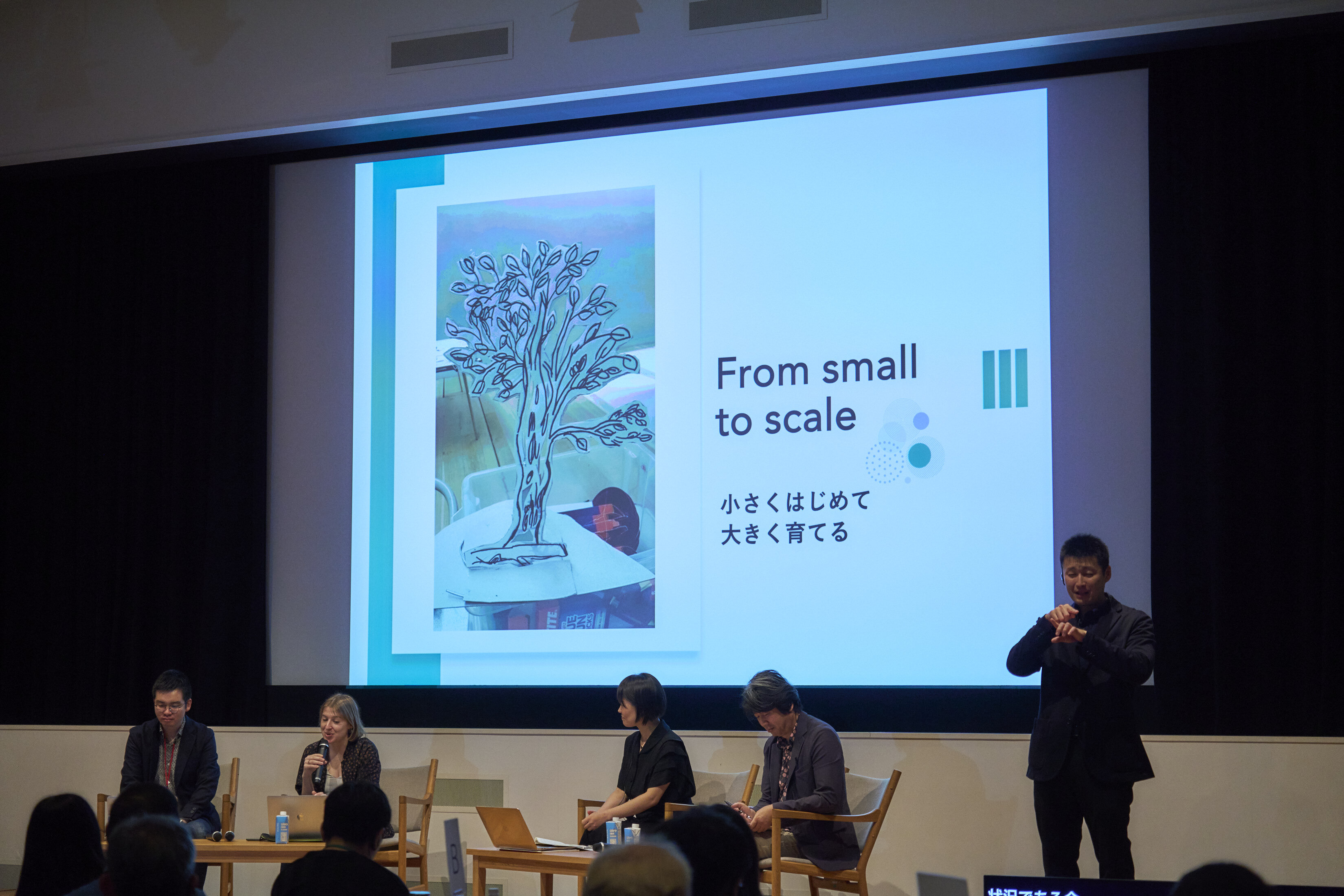
Presentation by Jane Findlay(Photo: Ryo Fujishima)
This talk introduced a case study that demonstrated collaboration between the Dulwich Picture Gallery and the NHS's Tessa Jowell Health Center. These two organizations have formed a partnership for a duration of 4 years with the common goal of reducing health disparities. Along with hosting art exhibitions and creative programming in hospitals, they also made practical efforts to incorporate creative art into local social prescription models. This collaboration with the Tessa Jowell Health Center, which opened in May 2020, was promoted during the pandemic. Jane Findlay underscored the numerous times the partners had to change their planned content and scheduling and praised their patience and perseverance. She also praised their step-by-step approach to nurturing the pilot efforts as they evolved into more impactful programs, achieving smaller goals along the way. The concept of ‘starting small and growing big’ that Jane mentioned had such a profound impact on the participants that it could be considered a defining theme of the forum.
Tokyo Metropolitan Art Museum's Art Communication Initiative for the Super-Ageing Society: "Creative Ageing Zutto Bi"
Speaker: Hayato Fujioka, Curator, Tokyo Metropolitan Art Museum
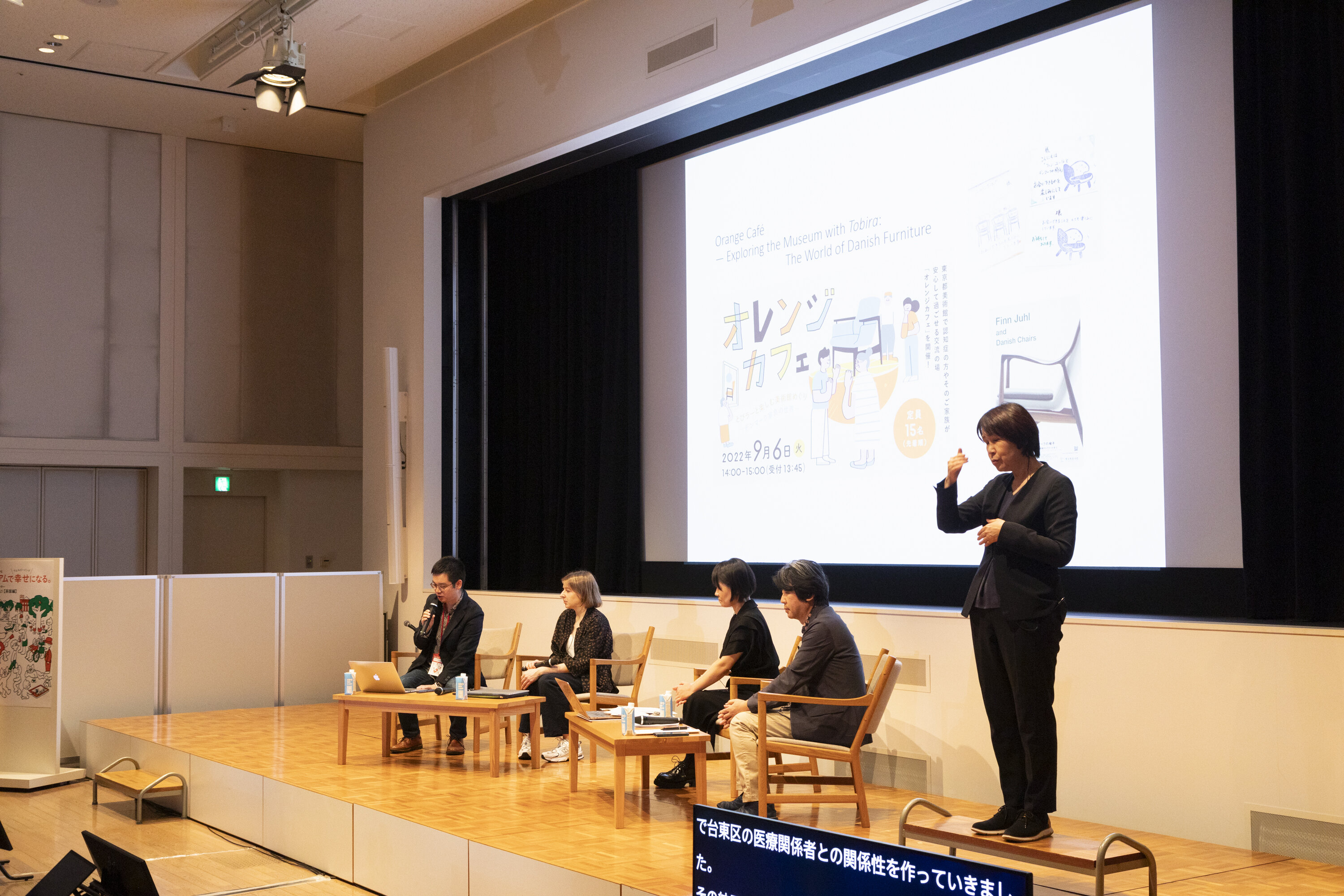
Presentation by Hayato Fujioka(Photo: Mai Narita)
The final talk reported a domestic case study detailing the Tokyo Metropolitan Art Museum’s Creative Ageing Zuttobi, which aims to challenge the stereotype that being a senior automatically means experiencing ‘old age’ or ‘decline’, and instead focuses on the concept of ‘growing old creatively’. During the presentation, the speaker highlighted two specific initiatives: the Van Gogh at Home online viewing event for individuals with dementia and their families, and the Orange Café, which, a collaboration with the Taito Ward Social Welfare Council that provides a gathering place for people with dementia and their families. Hayato Fujioka shared his perspective as someone with experience leading the project. It was apparent that many participants understood the ongoing challenges of engaging people with dementia in museum activities. Furthermore, he also shared ideas for developing activities over the medium to long term; he stated that ‘First of all, it is important to continue, and after that, it might be good to involve as many people as possible’. It was a thought-provoking talk that gave a realistic picture of the situation.
Question and answer sessions were held between the talks to allow the speakers and the participants to delve deeper into the content through dialogue.
Dialogue Session
After the talks, the dialogue session were conducted in both live and online settings. In-person participants were seated at tables with 4-5 seats, where they exchanged their opinions using sticky notes and mock paper. Online participants shared their opinions using the Miro whiteboard tool.
Reflection Session
Finally, in addition to the five guest speakers, five hosts from the Tokyo University of the Arts, the British Council, and the National Center for Art Research (NOTE) gave reflection talks. The author would like to conclude this report with some of their most impressive suggestions. First, the importance of engaging in dialogue with partners and stakeholders is emphasized. Collaboration across diverse fields is crucial for achieving health and wellbeing, as it allows for the utilization of a wide range of expertise. The significance of stepping out of one's comfort zone and exploring new territories is also emphasized, along with the importance of actively listening to others, particularly since this advice comes from a practitioner with firsthand experience. Additionally, the importance of academic scholarship is reiterated. This involves gathering evidence from multiple organizations and re-evaluating practical case studies within a reasonable timeframe. The talks also highlight the need to be cautious of becoming entrenched in conventional ways of thinking. Given that long-term efforts are required, both organizations and the activities themselves must cultivate resilience. Finally, the speakers emphasized addressing health and wellbeing from a global perspective and cautioned against limiting ourselves to one organization or to Japan.
Notes
(1)The My House of Memories worksheet for recording memorable photos or items that evoke memories.(2)The following four speakers were hosts: Katsuhiko Hibino, Tatsuya Ito (Tokyo University of the Arts), Matthew Knowles (British Council), Mami Kataoka, Sawako Inaniwa (National Center for Art Research)


